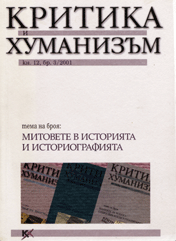Za obrazovanieto bez salzi ili mitat za "dobria metod"
About the Education without Tears - or: The Myth of "The right Method"
Author(s): Julieta Velichkova-BorinSubject(s): Cultural history
Published by: Фондация за хуманитарни и социални изследвания - София
Summary/Abstract: "The right method" in education ought to ensure the effectiveness of learning and should contribute to the moral improvement of people in favour of their humane relations. Education without tears, dealings without disappointment, mutual accusations, humiliation and violence: it seems we aim at the highest. Is this "right method" feasible? The myth of "the right method" has been consecutively constructed in the field of educational theory and practice since the rise of the educational institution. The usage of teaching as a historically established practice of cultural transfer forces us to note the Protestant experience concerning the individualisation of the educational process and the clear criteria of iright methodi, laid down by the Protestant pedagogy in consequence. The historical approach to the problems also requires that we give "the pedagogical fermentation" in 18th century France credit for realising the social power of education as a derived function of "the right method". The characteristic features of "the right method", both determinate as an individual means of improvement and a social practice of universalization of values contribute to its mythicisation. The social function of the myth finds support in the modern pedagogical sensitivity to necessity of new kind of curricula and in some changes in the process of education according to new educational aims and knowledge. The analysis of Bulgarian and French handbooks from the 19th century could help us to give the right answer concerning the myth of ithe right methodi in the field of Bulgarian educational tradition as a part of the European cultural experience.
Journal: Критика и хуманизъм
- Issue Year: 2001
- Issue No: 12
- Page Range: 111-133
- Page Count: 23
- Content File-PDF

